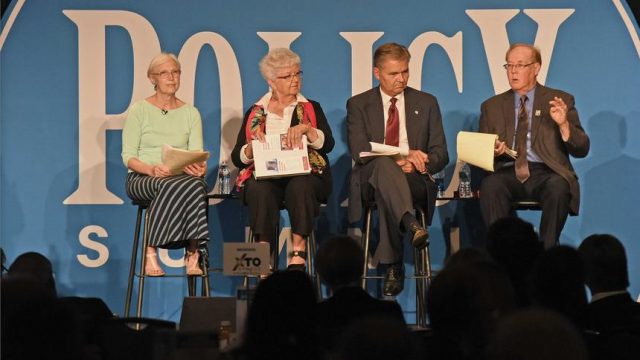Free Speech Group Says Ethics Ballot Measure May Violate the 1st Amendment

“North Dakota’s current campaign finance and lobbying laws are already unclear. The initiative could raise serious First Amendment concerns because of the additional vague rules it appears to impose on citizens and groups that wish to speak about public matters and state government,” says Eric Wang, a senior fellow at the Institute for Free Speech.
Wang is talking about the ballot measure to create an ethics commission which will be Measure 1 on the statewide ballot in November. He notes in a thorough analysis of the measure that, in addition to creating an ethics commission, it would also institute a host of new restrictions and regulations on political speech which probably aren’t in keeping with the 1st amendment.
You can read the full analysis below (and the full text of the ballot measure itself here).
One notable criticism Wang has of the measure is this passage from Section 1: “The legislative assembly shall implement and enforce this section by enacting, no more than three years after the effective date of this article, laws that require prompt, electronically accessible, plainly comprehensible, public disclosure of the ultimate and true source of funds spent in any medium, in an amount greater than two hundred dollars, adjusted for inflation, to influence any statewide election, election for the legislative assembly, statewide ballot-issue election, or to lobby or otherwise influence state government action.”
[mks_pullquote align=”right” width=”300″ size=”24″ bg_color=”#ffffff” txt_color=”#000000″]By my reading of that measure, a private citizen starts a blog to advocate a point of view on certain bills during our legislative sessions they’d have to report any money they spent to the state. The media would have to report money spent on their editorials taking a stand on legislation or regulations or campaigns or ballot measures.[/mks_pullquote]
This is a requirement for the disclosure of any funds spent in any medium to influence any government action.
By my reading of that measure, a private citizen starts a blog to advocate a point of view on certain bills during our legislative sessions they’d have to report any money they spent to the state. The media would have to report money spent on their editorials taking a stand on legislation or regulations or campaigns or ballot measures.
Newspapers, websites, television stations, radio stations. These are all mediums. This ballot measure imposes reporting requirements on political speech in “any medium” with no exceptions.
“Such a law appears to be unconstitutionally vague and overbroad,” Wang writes. “The initiative’s reporting requirements would also appear to require filings by media organizations for any news reporting or opinions that could ‘influence any …election’ or ‘state government action’,” he continues.
I moderated a debate yesterday about this measure, and the proponents on the panel were pushed on this issue. They didn’t seem to have a good rebuttal to this claim, only suggesting that it would be “ridiculous” for their measure to be interpreted that way.
But what’s ridiculous about what the text of the measure actually says?
By a plain reading of what they’re proposing, anyone from newspaper companies down to private citizens acting on their own who spends more than $200 (adjusted for inflation!) to influence a government action in any way would have to report the source of their funds to the government.
Even just the “adjusted for inflation” part is an obnoxious requirement. Which inflation calculator do we use? Are we going to start punishing people because they used the wrong inflation calculator and thus thought they didn’t have to report?
Read Wang’s full analysis:
[scribd id=386419622 key=key-Mc55tg3oF6e2xUOCjwgZ mode=scroll]




